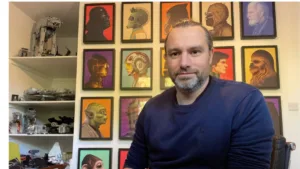Rob Webster is Founder of Canton Marketing Solutions. He’s worked in the adtech industry since 2001 and is NDA’s monthly adtech columnist.
These last few weeks the Canton team and I have been taking it in turns to have some much needed time off. It is really important that we all take the time to refresh and reinvigorate ourselves, and something that’s been really missing during the last 18 months or so. Throughout the middle of the year we have kept on adding to our amazing team as the company continues to grow. In between there has been some time to chat to old industry friends and the subject of talent and structure has been very much to the fore.
At a time when so many things that have happened have been unprecedented (I apologise for using this overused word) there is now unprecedented change in talent in agencies and other parts of the media service sector. We are seeing a changing of the guard.
As someone who is now in his second decade in marketing services it is staggering to see how many of my contemporaries with similar experience are leaving large agencies. Over the last 18 months we have also, sadly, seen many rounds of redundancies focussed largely on those with experience measured in decades. Many have started their own businesses (usually with great success), many are freelancing (ditto), a large number have moved client side and a smaller but significant number are getting out of the game all together. Whilst some have sadly struggled. it’s been amazing to watch the growth and innovation of this group powering a very vibrant industry.
Yet despite these people leaving and a fairly heavy use of furlough too, these same companies have job vacancies in the hundreds. Agencies are merging, being restructured, and launching new divisions with a staffing roster that looks very different from the last.
What is now so in demand is the practitioner (rather than the manager/team leader), those that are able to execute media or set up technology. This is partly a reflection on seniority and the need to cut costs, but mostly a result that what is needed now is people who can get their hands dirty and execute. Programmatic media buyers (particularly in social, but also search and display) are in particularly high demand but so too are SEO practitioners and analysts. Another area of high demand is technologists that also understand media and so are able to set up the data structures, dashboards and automation so in demand right now.
All these skills mentioned are far more in demand than there is supply, leading to inflated rates and a huge rise in freelancers and those doing more than one job to earn extra cash. Never has access to talent and the right talent been such a competitive advantage as now. Companies that have a wide pool to call upon and also have invested in training the next generation ahead of the curve have a big advantage right now.
As much as the catalyst has been the pandemic, this has been a long time coming. The modern giant agency holding company was invented to negotiate deals with a handful of large publishers and to spread (plan) the resultant media across their client portfolio. It was a model that needed a team of senior negotiators, experienced planning experts and an army of junior staff to service clients, run billing, advertising operations and logistics – think herding cats but with creative agencies, assets and client lunches thrown in.
This model, long disrupted by Google and Facebook’s refusal to give preferential rates in the manner of old and the emergence of digital buying platforms has reached breaking point. Suddenly it is not dealmakers, client services and operations that are needed but increasingly platform buyers, analysts and marketing technologists.
Some companies are handling this transition well, though many are struggling and the process has been difficult for individuals and companies alike. As well as those that have lost their jobs during the pandemic, reports proliferate of overworked teams covering staff on furlough and positions unfilled. Recent earnings reports show a big recovery in performance from the agency sector indicating the increasing media budgets (and workloads). Yet there is a concern this is just adding pressure to already overworked teams. When you combine the rapidly growing new breed agencies with the demand for fresh faces at the old guard and a client side also looking to bring core marketing capability in house and you end up with a huge demand for the en vogue talent described above.
There is a real risk that with the talent simply not available to meet the demand for some roles, pressure could reach boiling point for some as we get to the busiest time of year in Q4. This battle for talent will be one of the themes of the new era. Many agencies have noticed that they can be seen as talent nurseries for the tech giants (GAFA are inundated with ex agency staffers) and clients. Many see this as a negative though it’s a double-edged sword. I for one will be proud if Canton staff are prominent throughout successful businesses (as I am about previous employees from previous roles). Having ex colleagues at advertisers being a great way for your company’s strengths to be known amongst your target market.
As well as the changing of the guard in terms of personnel, the companies that dominate ad spend are also changing. Companies such as Essence, Merkle and Epsilon have become very prominent among the big holding companies whilst independents such as Sir Martin Sorrel’s recently rebadged MediaMonks, but also the likes of Jellyfish, Goodstuff, You & Mr Jones and Brainlabs are increasingly prominent. Consultancies, notably Accenture but also Deloitte, McKinsey and even the giant PWC are now prominent in media servicing with a wave of new breed consultancies (including my own Canton) growing quickly.
The new wave has much more digital focus of course but also a more consultative approach. These companies have not been encumbered by the legacy structures of the formerly dominant forebears. A topic for next month’s column is how some of them are perhaps too close to Google to be healthy. Yet one thing is clear, the power is shifting and competition is fierce. We can expect the refreshed rosters of the likes of MediaCom, Carat, OMD and Zenith to fight to retain their space at the top.
Change such as this can always be painful but it’s leading to a healthier future. The new structures are much flatter than the old, with much more respect afforded talent at the earlier part of their careers than was the case a decade ago. A flatter, less hierarchical structure is now a common theme amongst the fastest growing companies and is one where once the dust settles after the pandemic I expect talent to thrive. Rather than the pyramid structure a network of equal talents can come together to deliver marketing excellence.
The work/life balance promises to be better also, in previous eras working 70-hour weeks or more was considered a badge of honour, presenteeism was rife. Now, with the need for talent so acute companies are falling over themselves to offer a better work life balance – I hope and believe this trend will continue as the pandemic ends as it needs too to retrain and attract talent. I also hope and expect to see a real balance between the needs of the individual, some of which will rightly want and choose to be mostly remote, others will prefer the learning and networking opportunities of face-to-face with the benefits of the group. For those, often the younger generation, who will benefit from the face-to-face time can only get it if the previous generation are prepared to share their time and brave the commute at least for a day or two a week. Some companies can succeed being fully remote yet for most I think a mixed approach will be the best for all, young and old, experienced and learning.
Diversity, for several reasons sadly, has suffered during the pandemic and it will be vital for the health of the sector that this is reversed as hiring increases and that there is investment in talent from all walks of (and stages of) life. Yet again here I am confident with the growth of such amazing programs as Brixton Finishing School and practice makes imperfect to name but two.
This article may sound like I am down on the old ways. Yet nothing could be further from the truth. I have always loved working in such a dynamic industry and wouldn’t change it for the world. Yet the arrow of progress moves in one direction and I am excited to see the next generation of marketing emerging. The pandemic has been hard on so many for a variety of reasons yet it has also driven much needed improvements at a record pace.
Marketing and communications in the information age is a vitally important part of how the world works. It should be a vocation to be proud. It is my belief that as an industry we can largely be proud of how we have adapted during the pandemic and though there is much work to be done we are insight of a better industry for the future. It’s one I look forward to working with you all in.








